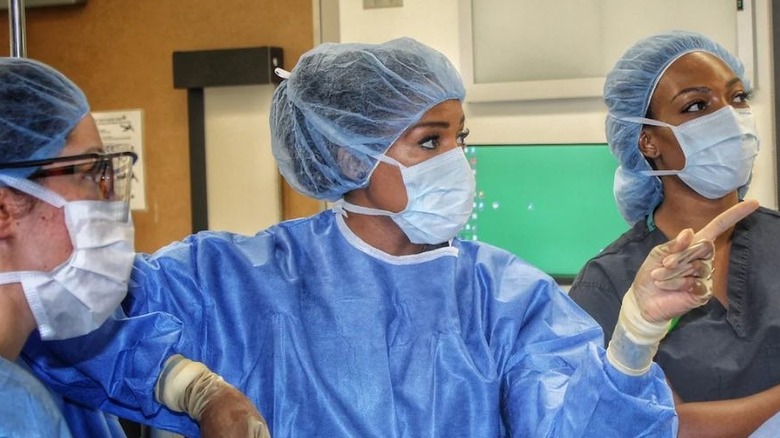OB-GYN And Women's Health Expert Jessica Shepherd Talks Endometriosis Awareness Month - Exclusive
Health Digest sat down with Dr. Jessica Shepherd, an OB-GYN and women's health expert, during Endometriosis Awareness Month and learned more about this gynecological disease. Endometriosis, which impacts about 10% of people who have a uterus, occurs when tissue similar to the endometrium that lines the uterus grows outside of the uterus. The diseased tissue outside of the uterus behaves just like the lining of the organ. Each month during the menstrual cycle, the tissue bleeds and tries to expel itself from the body. This process causes chronic inflammation and damages the surrounding tissue. This leads to a buildup of scar tissue and the formation of adhesions, which cause the organs of the pelvic region to stick together.
Endometriosis causes very difficult periods, characterized by severe abdominal and pelvic cramping, heavy menstrual bleeding, and pain during intercourse. It can also cause bowel problems, bladder problems, bloating, fatigue, and sometimes infertility. People often suffer for years before finding out they have endometriosis because it's difficult to diagnose and because of a lack of education around abnormal menstruation.
What's a 'normal' period?
Because talking about menstruation has been taboo for so long, many people don't even know that they're experiencing symptoms of endometriosis. They dismiss severe cramps, long periods, and heavy menstrual bleeding and think they just have to endure. That's one of the major reasons why Dr. Jessica Shepherd makes it her mission to talk about menstrual health. In speaking with us, she stressed that each body is different; therefore, each menstrual cycle will be a little different. However, there are some guidelines that can help you determine if your period is more on the normal or abnormal end of the spectrum.
"A true regular cycle [is] every 28 to 30 days, plus or minus a day," Shepherd explained. "And it should last anywhere from five to seven days. But you may have some that are plus or minus one from that four to eight, or even four to nine days." She continued, saying, "And then when we think of the flow, you would think that the flow would usually start heavier in your first through third day, and then start to taper off."
Periods that fall outside these parameters can be considered abnormal and may indicate endometriosis or another gynecological disease (via Cleveland Clinic).
Talking to your doctor about pelvic pain
Dr. Jessica Shepherd told Health Digest that severe pelvic pain is one of the hallmarks of abnormal periods, especially those caused by endometriosis. Thus, assessing pelvic pain is one of the most important parts of getting an endometriosis diagnosis. However, pelvic pain is incredibly hard for doctors to assess because they can't feel what their patients are feeling.
Shepherd emphasized the importance of finding a doctor "who's going to be on the journey with you." She explained that a good doctor-patient relationship is built from both sides. The patient needs to trust their "body awareness" to know when something is off, feel safe enough to speak honestly, and feel like their doctor is taking them seriously. To make this possible, the doctor needs to deeply listen, trust their patients' experiences, and be willing to offer multiple treatment modalities, including non-traditional modalities.
If your pelvic pain is so intense that it's interfering with your life each month or even daily, trust your experience and find a doctor who will collaboratively guide you through diagnosis and treatment. Shepherd stressed that if a patient feels like they're not being heard, they should change providers.
Dr. Jessica Shepard is an OB/GYN and Medical Advisor to O Positiv. To learn more about O Positiv's doctor-approved gummy vitamins, visit OPositiv.com.



